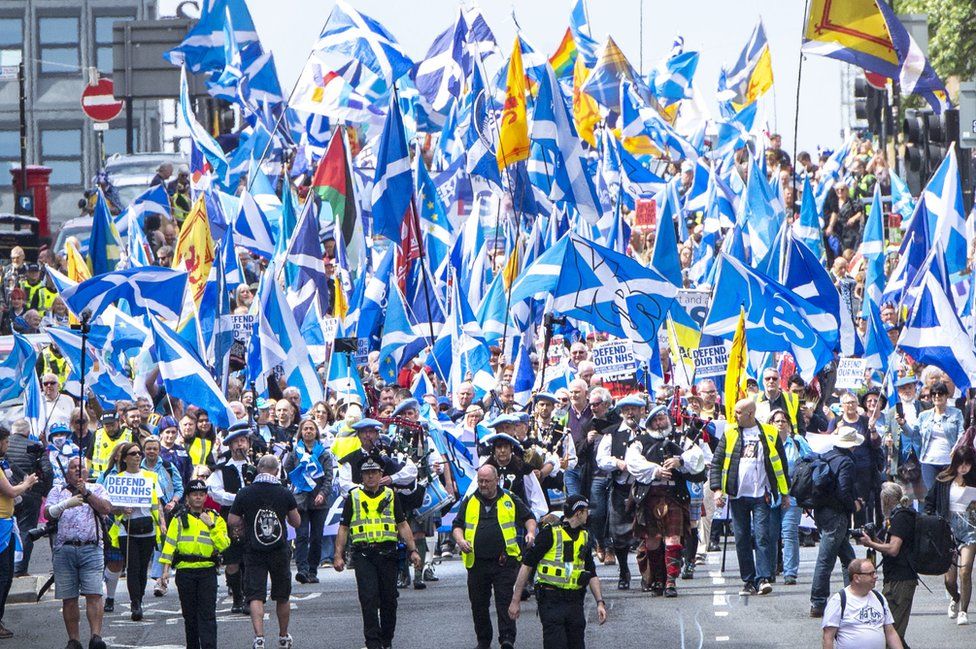ARTICLE AD BOX
 Image source, PA Media
Image source, PA Media
The cross-party All Under One Banner movement holds regular independence marches
By David Wallace Lockhart
BBC Scotland political correspondent
The route to independence used to seem simple for SNP members.
There was a widespread expectation in the party that election victories would lead to a second referendum.
But the continued UK government refusal to grant another vote, and last year's Supreme Court confirmation that Holyrood doesn't have the powers to legislate for one, has left the party looking for a new direction.
And that's why members will descend on Dundee this weekend.
At the party's Convention on Independence, they hope to flesh out a new strategy.
So what are the alternative paths to independence?
This isn't an exhaustive list, but here are three options the SNP may consider this weekend.
A gradualist approach
Option one could be called the gradualist approach.
This involves taking time to drive up support for independence, ultimately reaching a level that means Downing Street can't ignore referendum demands.
It's rare for anyone in the SNP to publicly put a number on the level of support needed for this, but a sustained period of 60% pro-independence polling is thrown around privately.
The MSP Ben Macpherson is a former Scottish government minister. He stresses that he's as dedicated to independence as anyone in the SNP, but he believes that patience is required.
He's urged fellow members to focus on convincing more undecided voters to support independence, which he believes will create "overwhelming" pressure on the UK government to grant a second referendum.
De facto referendums
But others feel another referendum won't happen, and that brings us to option two. This involves using elections to secure independence.
It's a tactic that's gained prominence in SNP circles in recent years.
Towards the end of her leadership, Nicola Sturgeon floated the idea of running an election as a "de facto" referendum.
The concept is fairly simple: the SNP would contest an election (or elections) insisting that a vote for them is a vote for independence. This could be stated in the opening line of a manifesto.
Ash Regan, who ran to replace Nicola Sturgeon earlier this year, backs this approach.
Image source, PA Media
Image caption,Former SNP leadership contender Ash Regan backs the de facto referendum strategy
She believes the SNP could even team up with other pro-independence parties, meaning that more than 50% of the vote combined would lead to independence.
She thinks it's time to move away from relying on the referendum path, saying "we've been thinking of it as the gold standard, but in fact it's the ballot box that's the gold standard route".
But there are potential weaknesses with this option.
Why would the UK government agree to this? Would the international community recognise it?
Most advocates of such a Plan B feel that Westminster intransigence on a second referendum means that a radical alternative is needed.
But others fear it won't deliver independence and would alienate the middle-ground of Scottish politics.
Public demonstrations
Option three involves taking to the streets - mass demonstrations calling for independence.
Perhaps this option should be seen as complementing others, rather than being a route to independence in itself.
The cross-party All Under One Banner movement will march from Stirling to Bannockburn at the very same time the SNP gathers in Dundee.
Patrick McCarthy is organising Saturday's All Under One Banner march
As a party member, Patrick McCarthy could have attended the convention. But he worries the SNP is simply "talking to themselves" .
He'll be "speaking to the mass movement" by organising the march instead.
He says "the hearts and minds and belief in independence is the thing that's going to get us over the line".
The first minister will set out his preferred route to independence at Saturday's convention.
Image source, PA Media
Image caption,The first minister must show SNP members that he has an indy plan
Humza Yousaf wants to drive up overall support, but he's also said that elections must be used to advance the cause of independence.
This convention won't rubber-stamp any strategy. That would have to come at the SNP's autumn conference.
There are political risks for Humza Yousaf in this weekend's convention.
It could highlight splits within his party. And it exposes him to accusations that he's prioritising the constitution over day-to-day problems.
But, given that independence is his party's fundamental aim, it's important for him to show party members that he's formulating a plan to achieve the ultimate goal.
The SNP may emerge closer to defining their strategy on independence, but making that a reality feels a harder task for the party right now.

 1 year ago
28
1 year ago
28








 English (US) ·
English (US) ·